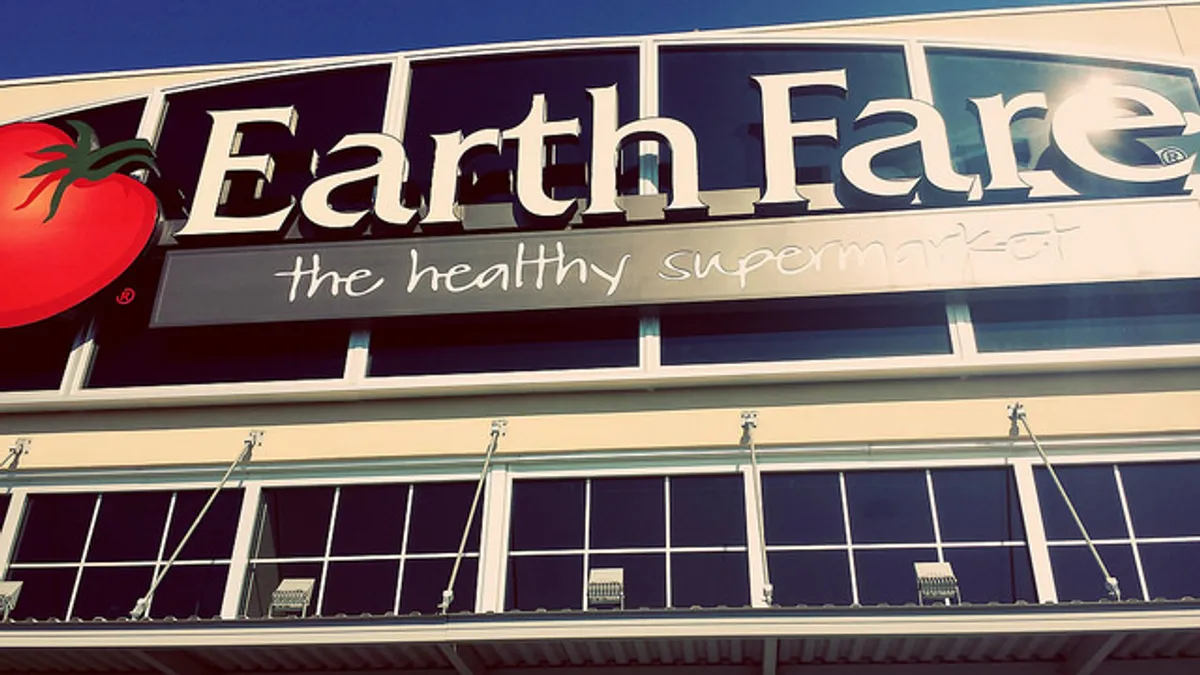Dive Brief:
- A group of investors that includes the founder of the bankrupt Earth Fare chain of natural foods stores, Roger Derrough, was selected as the winning bidder for four Earth Fare stores during the retailer's bankruptcy auction last week, according to local reports and court filings. The group, which is led by Asheville businessman Dennis Hulsing, bid $1.9 million for the stores, which are located in Asheville; Boone, North Carolina; Roanoke, Virginia; and Athens, Georgia.
- The group tried unsuccessfully to acquire a fifth Earth Fare store through the auction, according to the Asheville Citizen Times. That store, in South Asheville, North Carolina, went instead to Whole Foods, which bid $1.6 million. Whole Foods also successfully bid $900,000 for an Earth Fare location in Chattanooga, Tennessee, according to a March 25 court filing.
- Other winning bids were filed by Winn-Dixie, which picked up four Florida stores located in Boynton Beach, Lakewood Ranch, Viera and Jacksonville; and Aldi, which secured a store in Tallahassee, Florida. The selloff netted around $6 million for Earth Fare.
Dive Insight:
The investors that bought the four Earth Fare stores, identified in court documents as DJ3 Delaware, plan to launch a chain of as many as eight supermarkets under the Earth Fare name, with headquarters remaining in Asheville, according to the Citizen Times. Bethany Turon, a former executive of the company that is being dissolved, will be the the entity's CEO, the newspaper reported.
In an interview with the Citizen Times, Derrough indicated the revived Earth Fare would be more of a return to the company's earlier form, which emphasized local foods and a community-focused approach. In a previous interview with a local news station, the Earth Fare founder expressed disappointment at its rapid expansion and mismanagement after he sold it in 2007.
"The (number) is not the most critical thing to me," Derrough told the Citizen Times. "It’s more the heart of the store, whether it’s eight or 50."
Earth Fare filed for Chapter 11 bankruptcy protection in February, just a day after announcing that it would close all of its approximately 50 locations — and scarcely a year after rolling out plans to double its store count by 2024. Earth Fare blamed its debt load and "continued challenges in the retail industry" for its collapse, a situation that analysts said was brought on by the chain's effort to grow at what turned out to be an unsustainable pace.
The chain was founded in 1975 and took 30 years to expand to a dozen locations, then put the pedal to the metal after being taken over by two successive private equity firms. The chain struggled to stand out from competitors as it attempted to ramp up its size, leading to its downfall.
Word that the founder of Earth Fare is involved in a plan to rejuvenate the grocery brand comes at the same time another once high-flying natural foods retailer, Lucky's Markets, is also poised to begin life anew by going back to its roots. Lucky's announced Friday that a company led by its founder, Bo Sharon, was the winning bidder for two stores run by the chain, which couldn't hold its own against competitors. Like the group that includes Earth Fare founder Derrough, Sharon was outbid by rivals for some of the stores he attempted to acquire. He agreed to pay $1.16 million for the two stores.
A third supermarket chain, Fairway Market, also held a bankruptcy auction last week that was precipitated by a failed effort scale its business model beyond the market where it got its start. Fairway, a household name in parts of New York City, last week said it had sold some of its assets at auction to bidders that included a pair of rivals in the New York food-retailing sector as well as Amazon. Like Earth Fare, Fairway sank under the weight of an expansion thrust upon it by private equity investors.













